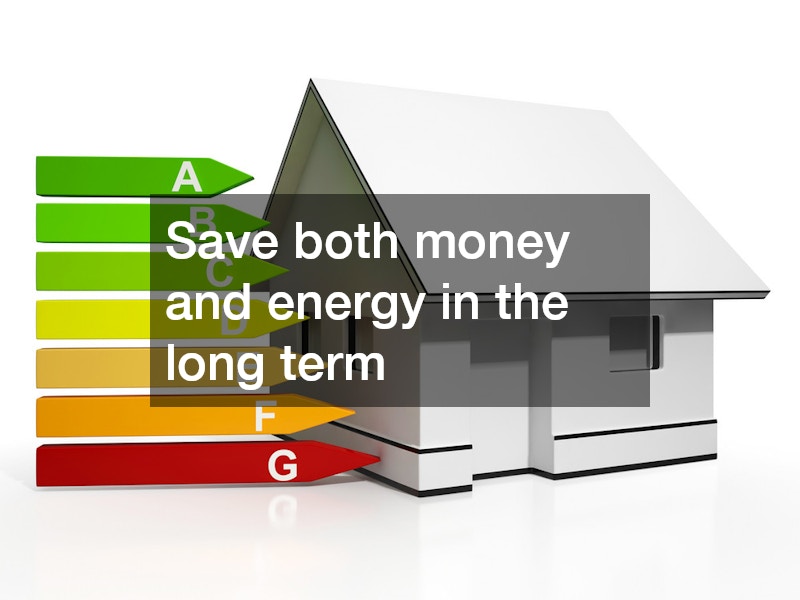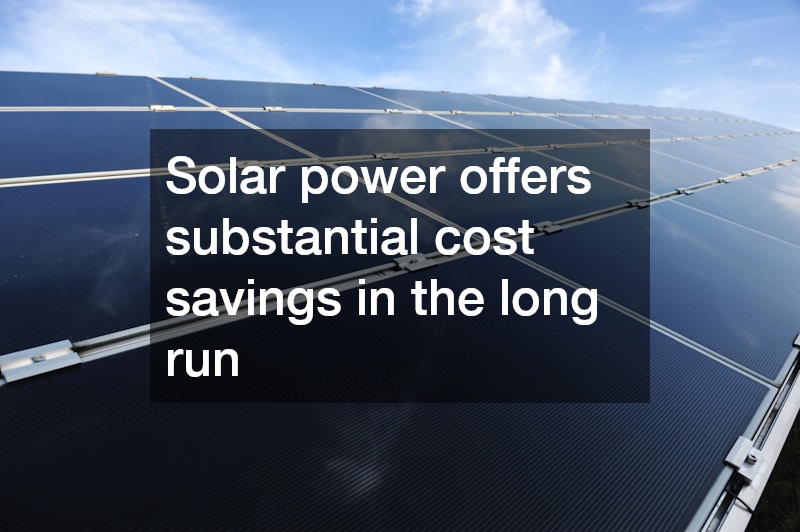Adopting energy-efficient methods is no longer a luxury in today’s fast-paced world. Environmental concerns and economic pressures have become more prevalent. This article explores the importance of energy efficiency by 2024 and provides practical tips to help individuals and businesses reduce their energy consumption.
Understanding Energy Efficiency
The goal of energy efficiency is to maximize output and minimize input by utilizing the available energy resources. It means getting the results you want with the least energy possible. Upgrades to energy-efficient appliances are a key component of reducing home energy consumption. Modern appliances, from refrigerators to washers, offer better energy efficiency than their predecessors. It is also important to take into consideration the importance of proper insulation and sealing, which prevents heat loss in winter and maintains cool temperatures during summer. This reduces the workload placed on heating and cooling units. Residential roofing contractors are also able to give you advice.
The Importance of Energy Efficiency in 2024
The urgency to address environmental concerns is greater than ever as we move into 2024. Energy consumption has a huge impact on the planet. From carbon emissions to resource depletion. Energy efficiency is a key factor in mitigating the effects of these factors. Adopting energy-efficient methods is also beneficial for individuals and businesses, given the rising costs of energy and the economic uncertainty. In addition, government incentives, regulations, and other factors are favoring energy-efficient solutions. This is a further incentive for adoption.
The push to improve energy efficiency will be driven by cost savings in 2024. Reduced energy consumption can help households and businesses reduce their utility bills, and better allocate resources. Investing in energy-efficient options, such as LEDs, can result in substantial savings over the long term on electricity costs. Smart thermostats allow for precise heating and cooling control, optimizing energy consumption and minimising waste. To maintain efficiency, you may have to invest in roof repairs.
Simple Ways to Cut Home Energy Use

Upgrades to energy-efficient appliances are a key component of reducing home energy consumption. Modern appliances, from refrigerators to washers, offer better energy efficiency than their predecessors. It is also important to take into consideration the importance of proper insulation and sealing, which prevents heat loss in winter and maintains cool temperatures during summer. This reduces the workload placed on heating and cooling units. Smart thermostats allow for precise temperature control, optimizing energy consumption based on occupancy patterns. A siding contractor can help.
Sealing and insulation are important aspects to take into consideration, as these prevent heat loss in winter and maintain cool temperature levels in summer. This reduces the workload of heating and cooling systems. The home’s energy efficiency can be improved by investing in high-quality materials for insulation and sealing gaps and leaks around windows, doors and ductwork. Regular maintenance of HVAC systems will ensure optimal performance, identify any potential problems before they become serious, and save both money and energy in the long term. Invest in asphalt paving for residential areas!
Choosing Energy-Efficient Lighting Options
Lighting is a major contributor to residential energy consumption. This makes it an ideal target for improving efficiency. The lighting industry has been revolutionized by LED bulbs. They are energy-efficient and long-lasting. LED bulbs consume up to 80% of the energy of traditional incandescents and last much longer. Compact fluorescent bulbs (CFLs) are also a viable alternative, as they offer improved efficiency over incandescent bulbs. Smart lighting systems also offer advanced control features, allowing the user to adjust brightness and customize lighting schedules to meet their needs.
It’s important to consider not only energy savings but also other factors, such as color temperature and brightness. LED bulbs are available in different color temperatures—from warm to cold—allowing you to create the ambiance that suits your home. Dimmable LED bulbs provide additional flexibility and control of lighting levels, further enhancing energy efficiency and comfort. Window replacements in your local area can make a big difference.
Energy-Efficient Heating and Cooling Tips
The heating and cooling systems in the home are major energy consumers, particularly in areas with extreme weather conditions. For optimal performance and efficiency, regular HVAC maintenance is essential. Cleaning or replacing air filters, for example, can improve airflow and lower energy consumption. Programmable thermostats are another way to save energy by automatically adjusting temperature based on pre-set schedules. Zoned heating and cooling is a great option for multi-story or larger buildings. It allows you to customize comfort levels in different rooms, which minimizes energy waste.
In addition to smart thermostats and regular maintenance, energy-efficient heating/cooling strategies can reduce costs and energy consumption. Natural ventilation methods such as using ceiling fans and opening windows can help circulate the air and maintain a comfortable temperature without relying on HVAC systems. Investing in energy-efficient HVAC equipment such as heat pumps and geothermal systems can also provide long-term savings on energy.
How to Avoid Phantom Energy
The energy used by electronic devices while they are not being used is known as phantom energy. Televisions, computers and chargers are all common culprits. The first step in tackling this problem is to identify phantom power users. When not in use, power strips that have timers and switches built-in can be used to cut power to several devices at once. Also, by investing in energy-efficient appliances and unplugging your devices when you are not using them, you can reduce the amount of phantom electricity consumption. Contact window contractors today!
Energy-efficient appliances and optimizing your energy use habits can result in significant savings over the long term. Choosing ENERGY STAR appliances and electronics, for example, ensures optimal performance and reduces standby energy consumption. Adopting energy-saving measures such as switching off electronics and lights when they are not being used, adjusting the thermostat when you leave home and maximising natural lighting will also reduce energy waste.
Is Solar Power the Ideal Energy-Efficient Option?

Solar power is a great solution for businesses and individuals who want to reduce their dependence on traditional sources of energy. Solar power is not only environmentally friendly, but it also offers substantial cost savings in the long run. It is important to consider several factors before investing in solar panel installation, such as the suitability of your property, local regulations and the upfront costs. Tax credits and rebates can offset the initial costs and speed up the return on solar installation.
Evaluation of the solar potential on your property, in addition to financial considerations, is crucial for determining whether solar power generation will be feasible. Roof orientation, shading and space are all important factors in maximising solar energy production. A reputable solar installer will be able to provide you with valuable insight and make recommendations that are tailored to your needs and circumstances. Solar energy can be made more affordable and accessible for businesses and homeowners by exploring various financing options, such as solar leasing or power purchase agreements.
Making Your Workplace More Energy-Efficient
Employers and employees must work together to create an energy-efficient office. Energy savings can be achieved by encouraging energy-saving habits, such as switching off lights and equipment while not in use. Investing in energy-efficient equipment such as ENERGY STAR appliances and electronics can also reduce energy consumption. Energy-saving efforts can be further enhanced by educating employees about the importance of energy efficiency and training them on best practices. HVAC services are essential.
Technology can be used to monitor and manage energy consumption more efficiently. Installing occupancy sensors and automated light controls, for example, can reduce energy consumption by only activating lights when necessary. Building energy management systems allow for central control and monitoring of HVAC, lighting and other energy-consuming appliances. This allows real-time energy optimization and savings. You can also take advantage of siding services.
Energy-Saving Tips for Transportation
Transport is another area in which energy efficiency has a significant impact. Carpooling or using public transport can reduce not only fuel consumption but also traffic congestion and emissions. Hybrids and electric cars are a sustainable alternative to gasoline-powered vehicles, offering lower operating costs and a reduced impact on the environment. Fuel-efficient driving habits such as avoiding sudden accelerations and maintaining steady speeds can improve fuel economy. Plumbing services for residential properties are also available.
Optimizing vehicle maintenance, as well as driving habits and alternative transportation methods, can help to save energy. Regular maintenance, including tire rotations and oil changes, can ensure vehicles are operating at their peak efficiency, reducing fuel consumption. Eco-driving techniques such as maintaining constant speed, avoiding excessive idle time, and reducing the use of air conditioning can also improve fuel efficiency. Combining alternative transportation with efficient driving techniques, individuals can contribute to a cleaner and more sustainable environment by reducing their carbon footprint.
How to Monitor and Manage Your Energy Usage
It is important to monitor and track energy consumption in order to identify areas of inefficiency. This will allow you to implement targeted solutions. Smart meters can provide users with real-time information on energy consumption. This allows them to identify savings opportunities and track usage patterns. Apps that monitor energy consumption provide additional analytics and insights, allowing users to visualize and track their energy usage and set goals. Individuals and businesses who actively monitor and manage their energy usage can maximize efficiency and reduce long-term costs. Electricians can help you!
In addition to monitoring energy consumption, identifying areas with high energy consumption will help you prioritize your energy-saving efforts. An energy audit, for example, can identify inefficiencies in heating and cooling, lighting, and appliances. This allows for targeted improvements and cost savings. Sub-metering can also provide valuable insights into energy consumption, which will help you make informed decisions and change your behavior. Individuals and businesses can reduce energy consumption by leveraging data analytics and technology.
The Bottom Line
Energy efficiency is a key component of sustainable living, and the economic prosperity of our world. We can help to reduce our carbon footprint and lower energy costs by adopting energy-efficient practices at home and work. This will also contribute to a more sustainable and cleaner future for future generations. There has never been a more ideal time to put energy efficiency at the forefront of our daily lives. Seize this opportunity to create a world that is more energy-efficient for everyone.
In addition, the transition towards a society that is more energy efficient requires collaboration and collective action across different sectors. All stakeholders, including governments, businesses, local communities and individuals, have a part to play in advancing the energy efficiency agenda. We can work together to accelerate the adoption and implementation of energy-efficient policies, technologies and practices. This will pave the way for an environmentally friendly and sustainable future. Each of us can make a positive difference, whether it is through energy-saving measures at home, investing in renewable sources of energy, or advocating policies that promote energy efficiency. Let’s harness this collective power to create a better and more sustainable future for us and our children.
